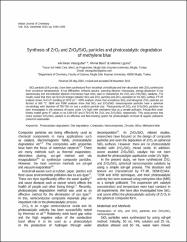Synthesis of ZrO2 and ZrO2/SiO2 particles and photocatalytic degradation of methylene blue
Abstract
SiO2 particles (0.6 mu m dia.) have been synthesized from tetraethyl orthosilicate and then decorated with ZrO2 synthesized from zirconium tetrabutoxide. X-ray diffraction, infrared spectra, scanning electron microscopy, energy dispersive X-ray spectroscopy and transmission electron microscopy have been used to characterize the ZrO2 and ZrO2/SiO2 catalysts. The results reveal that there are Si-O-Zr bridges between SiO2 and ZrO2 particles and ZrO2 deposited on the SiO2 surface. FT-IR analysis shows Si-O-Zr bonding at 1073 cm(-1). XRD analysis shows that amorphous SiO2 and tetragonal ZrO2 particles are formed at 500 degrees C. SEM and TEM analyses show that SiO2 and ZrO2/SiO2 nanocomposite particles have a spherical morphology with diameter of 700-750 nm and a uniform particle size. Photoactivity of ZrO2 and ZrO2/SiO2 particles has been investigated in the presence of ozone under UV light with methylene blue as a sample pollutant. Pseudo-first order kinetic model gives R-2 values to be 0.69-0.97 and 0.79-0.93 for ZrO2 and ZrO2/SiO2 respectively. This study proves that ozone assisted ZrO2/SiO2 catalyst is an effective and fast-reacting system for photocatalytic removal of organic pollutants present in wastewater.


















